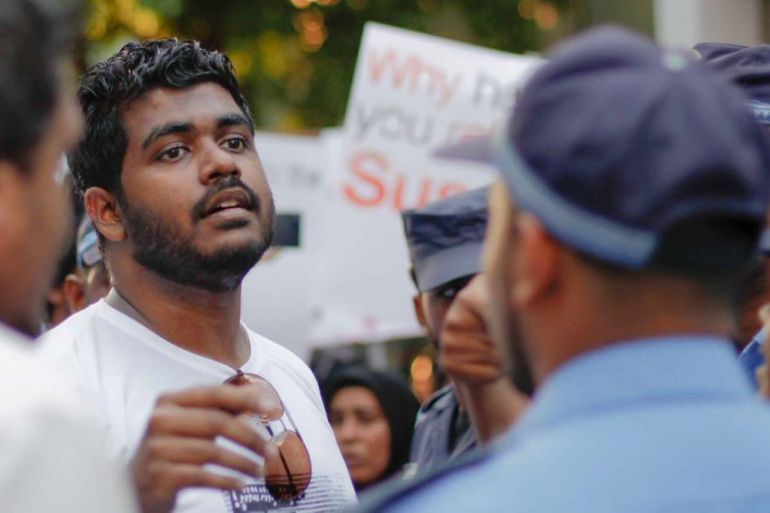(Bangkok, Geneva, 7 June 2017) – The Maldives faced unprecedented censure today at the United Nations Human Rights Council (Council), as a number of States called attention to the human rights situation in the country. Speaking jointly, over 30 States called on the Government to engage with the Council to improve the human rights situation and conduct a genuine dialogue with the UN High Commissioner for Human Rights. The States also asked the Maldives to grant freedoms of assembly and expression to all, and enhance the independence of the judiciary and national institutions. The United Kingdom, speaking on behalf of the 30 States, called on the country to prevent intimidation of human rights defenders by those who promote violent extremism. In a different statement, 28 Member States of the European Union drew attention to the dire state of freedoms of expression and association in the Maldives. Similar concern was also reflected in an individual statement by the United States of America.
These statements at the 35th session of the Council follow the brutal murder of prominent writer and human rights defender Yameen Rasheed on 23 April 2017. Yameen Rasheed had been a vocal critic of rising religious extremism, human rights abuses, injustice and government corruption in the Maldives. His killing featured prominently in the statements. Despite calls by the UN High Commissioner for Human rights to ensure a prompt and thorough investigation into his murder, and for the perpetrators to be brought to justice in line with international human rights laws and standards, the Government is yet to hold a credible investigation into his murder.
The Asian Forum for Human Rights and Development (FORUM-ASIA) welcomes this joint call for protection of human rights defenders. In the past few years, the Maldives has seen a singular increase in attacks against writers and critics of government corruption, human right abuses and religious extremism. In a joint open letter ahead of the Council session FORUM-ASIA and 27 other non-governmental organisations wrote to Member and Observer States of the Council pointing out that Yameen Rasheed’s murder is indicative of an increasing number of attacks against critical voices. In August 2014, journalist and blogger Ahmed Rilwan Abdulla was allegedly abducted outside his apartment. His fate and whereabouts remain unknown. In October 2012, a reformist religious scholar and Member of Parliament, Afrasheem Ali, was murdered.
Referring to these broader restrictions on the right to freedom expression in the Maldives, the joint statement regretted that ‘this right is being increasingly curtailed in a manner which contravenes both the provisions of the Constitution and the Maldives’ international human rights obligations, particularly with regard to journalists and other forms of media’.
Attacks on critics and human rights defenders have added a chilling effect to an already restrictive environment for media, human rights defenders, journalists, writers, online activists and political opponents. Amid increasing criticism over corruption, abuse of power and human rights violations, the Government resorted to harsher legislative measures to quash dissent.
In August 2016, the Government, in a move largely seen as an attempt to criminalise reporting on allegations of large-scale government corruption, enacted the Anti-Defamation and Freedom of Expression Act imposing hefty fines and prison terms for those convicted of defamation. The recent amendments to the already restrictive Freedom of Peaceful Assembly Act 2013 have effectively prohibited street protests. This has further been compounded by a weak judiciary and national human rights institutions whose independence has been compromised – a concern that has been previously raised by United Nations bodies.
‘Despite reporting numerous threats to the authorities, the State failed to protect Yameen Rasheed. It now has an obligation to take measures to prevent any future attack. It can start by ensuring justice for Yameen Rasheed’, says Hussain Rasheed, father of Yameen Rasheed.
‘The Government of the Maldives has an obligation to protect and prevent violent attacks against journalists, writers, social media activists and media, especially those who express views that are critical of the Government and non-state actors’, says Shahindha Ismail of the Maldivian Democracy Network. ‘Unfortunately, recent statements by senior government officials as well as attempts to criminalise critical bloggers, through court summons that insinuate insults to Islam, will only embolden perpetrators of such violence’.
‘While we welcome these concerns expressed by a large number of states, it is critical that the Council and its mechanisms monitor the situation in the Maldives on a continuous basis’, says John Samuel, the Executive Director of FORUM-ASIA. ‘Threats to human rights have seen a rapid increase recently, leaving the country in need of urgent international engagement to prevent further deterioration’.
For further information, please contact:
- R. Iniyan Ilango, UN Advocacy Programme Manager, FORUM-ASIA: [email protected]
For the PDF version of this press release click here.




